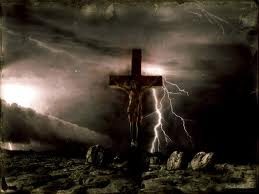
What is the Difference Between the Old and New Covenants?
We can see evidence all around us that our God is loving and full of grace. Even with so much pain and sickness in this world we can still see glimpses of the good He wants us to have. We see the sunshine every day, hear the birds singing and minute by minute we breathe in life-giving air. We see how most children are full of youthful vigor and joy, and we realize that our God is not One who is just waiting to see how much pain and death He can bring on those who have failed to live up to His rules, but that He wants us to be happy and full of life.
And we can look back down the years and see that even from the very beginning of Earth's history God has made some pretty amazing promises. He promised Adam and Eve that One would come that would restore them to their "promised land". Instead of destroying Adam and Eve right on the spot after they first sinned God demonstrated to them through the very first death, the sacrifice of an animal, that He (their Creator) would be the solution to the inescapable pit they were now in.
God repeated this promise to Abraham, Isaac, and Jacob, and to many others down through the years. (He even gave us an example of what He was planning to do for all those who trusted in Him when He gave Israel the land of Canaan, a land "flowing with milk and honey" that He had promised them.) He promised that through Abraham's seed the Deliverer would come. And of course we know that Jesus was that Promised One. Jesus died, just as all those lambs died down through the years, so that we might live and not die. And of course, that is the definition of Grace. We do not deserve to live, but because of the death of Jesus we are promised eternal life.
Old Covenant

The original covenant was the promise made to Adam, but what most people call the "Old Covenant" today is the promise that was made to the Israelites at Mt. Sinai.
Exodus 19
3And Moses went up unto God, and the LORD called unto him out of the mountain, saying, Thus shalt thou say to the house of Jacob, and tell the children of Israel; 4Ye have seen what I did unto the Egyptians, and how I bare you on eagles' wings, and brought you unto myself. 5Now therefore, if ye will obey my voice indeed, and keep my covenant, then ye shall be a peculiar treasure unto me above all people: for all the earth is mine: 6And ye shall be unto me a kingdom of priests, and an holy nation. These are the words which thou shalt speak unto the children of Israel.
Actually though this was a repeat of the promise God had given to Abraham, Isaac and Jacob hundreds of years before. God was going to do it all and they only had to trust Him to do it.
Exodus 6
2And God spake unto Moses, and said unto him, I am the LORD: 3And I appeared unto Abraham, unto Isaac, and unto Jacob, by the name of God Almighty, but by my name JEHOVAH was I not known to them. 4And I have also established my covenant with them, to give them the land of Canaan, the land of their pilgrimage, wherein they were strangers.
The Old Covenant, the promise by God to do only great things for His people, was all about grace and not about works. When He spoke the 10 Commandments from Mt. Sinai the Israelites told God that they would do all He had asked. The problem was that they tried to take things into their own hands, and before 40 days had passed they had failed miserably. Why? Because they failed to trust God's grace.
The Old Covenant was based on God's grace and man's trust of God, but of course we cannot begin to obey if we do not trust. Abraham and his wife Sarah demonstrated their lack of total trust in God's promise to give them a son by trying to help God out, but once they got back to totally trusting God then He did what He had promised He would do and gave them a son.
New Covenant
7For if that first covenant had been faultless, then should no place have been sought for the second. 8For finding fault with them, he saith, Behold, the days come, saith the Lord, when I will make a new covenant with the house of Israel and with the house of Judah: 9Not according to the covenant that I made with their fathers in the day when I took them by the hand to lead them out of the land of Egypt; because they continued not in my covenant, and I regarded them not, saith the Lord. 10For this is the covenant that I will make with the house of Israel after those days, saith the Lord; I will put my laws into their mind, and write them in their hearts: and I will be to them a God, and they shall be to me a people: 11And they shall not teach every man his neighbour, and every man his brother, saying, Know the Lord: for all shall know me, from the least to the greatest. 12For I will be merciful to their unrighteousness, and their sins and their iniquities will I remember no more. 13In that he saith, A new covenant, he hath made the first old. Now that which decayeth and waxeth old is ready to vanish away.

The blood of Jesus is the New Covenant. (Luke 22:20) It is only because of His death and resurrection that we gain eternal life. It is not by our works that we gain any part of this gift. This is God's doing, it is His grace. But we do have to trust Him to accomplish what He has promised to do.
The Difference
If both Old and New Covenants are based on grace and trust then what's the difference?

The Old Covenant's commands showed us our sins, much like a mirror shows us how dirty our face is. The animal sacrifices POINTED to the death of Jesus for us, but they did not take our place. There were laws that told us not to lie, steal or take the name of the Lord in vain, but they only showed us what was wrong. There was nothing wrong with these laws themselves, but they did nothing to remove our sins and therefore these commandments were seen as being faulty.
The New Covenant on the other hand was the "REAL THING", not just a "shadow of things to come". The 10 Commandments required the death of all who broke those laws. The Ceremonial Laws all pointed to One who would someday take those sins away, but when Jesus came He actually took our place and died for us. His death made it possible for God to be just, merciful and full of grace all at the same time.
Conclusion
Colossians 2
NIV 13 When you were dead in your sins and in the uncircumcision of your flesh, God made you alive with Christ. He forgave us all our sins, 14 having canceled the charge of our legal indebtedness, which stood against us and condemned us; he has taken it away, nailing it to the cross.
KJV 13And you, being dead in your sins and the uncircumcision of your flesh, hath he quickened together with him, having forgiven you all trespasses; 14Blotting out the handwriting of ordinances that was against us, which was contrary to us, and took it out of the way, nailing it to his cross;
If the New International Version of this passage is understood correctly by this writer it sounds like it's the debt we owe God (our own death) that was nailed to the Cross. And that makes sense because Jesus paid our debt.
If the King James Version is understood correctly by this writer it sounds as if the Handwriting of Ordinances (the Ceremonial Laws) is what was nailed to the Cross. Each of those Ordinances/laws pointed to Jesus death for us, and therefore kind of says the same thing. Jesus paid our debt on the Cross, and so these Ordinances no longer pointed forward to His death.
But if one reads these verses and others to mean that it was the 10 Commandments that were nailed to the Cross then we have a BIG problem because it was Jesus who said that all 10 commandments hung on two laws, love God and love man. And both of these are "love", so if "love" was nailed to the Cross then what? Are we now suppose to hate everyone? God is LOVE. He always has been and always will be loved by Him. He never changes. Are we to believe that Love was nailed to the Cross and so we are no longer expected to be loved, or to love anyone? Of course not.

Let's look at this from another point of view. We all agree that it is still a sin to steal, and still a sin to hate, and still a sin to use the Lord's name in vain. Are we not asked to honor our parents anymore? The Bible tells us that sin is the breaking of the Law, so does that mean because the Law was nailed to the Cross there isn't anyone sinning anymore? I think you get the point. No matter how you read it we all know that we must trust Jesus with all our hearts or we will not make it into His kingdom.
Even if you believe that Jesus nailed the 10 Commandments to the Cross, you still believe that He wants us to trust Him and live a "good" life, right? (By the way, what does "GOOD" mean?) And if you really trust Him then you will do what He asks. Or if you believe that He still wants us to keep His 10 Commandments and that they were not nailed to the Cross you know that there is NO way that you can actually keep them unless you trust Him to make it happen. Either way it comes down to trust on our part and grace on God's part.
So you and I need to ask ourselves, "Do I trust God totally, even if I do not see things happening as I think they should be happening? Even if it looks like God has forgotten about me will I keep on trusting that He will do what He has promised?"
The Law and the Covenants
“But if the Abrahamic covenant contained the promise of redemption, why was another covenant formed at Sinai? In their bondage the people had to a great extent lost the knowledge of God and of the principles of the Abrahamic covenant. . . . “God brought them to Sinai; He manifested His glory; He gave them His law, with the promise of great blessings on condition of obedience: ‘If ye will obey My voice indeed, and keep My covenant, then . . . ye shall be unto Me a kingdom of priests, and an holy nation.’ Exodus 19:5, 6. The people did not realize the sinfulness of their own hearts, and that without Christ it was impossible for them to keep God’s law; and they readily entered into covenant with God. . . . Yet only a few weeks passed before they broke their covenant with God, and bowed down to worship a graven image. They could not hope for the favor of God through a covenant which they had broken; and now, seeing their sinfulness and their need of pardon, they were brought to feel their need of the Saviour revealed in the Abrahamic covenant and shadowed forth in the sacrificial offerings. Now by faith and love they were bound to God as their deliverer from the bondage of sin. Now they were prepared to appreciate the blessings of the new covenant.” |

